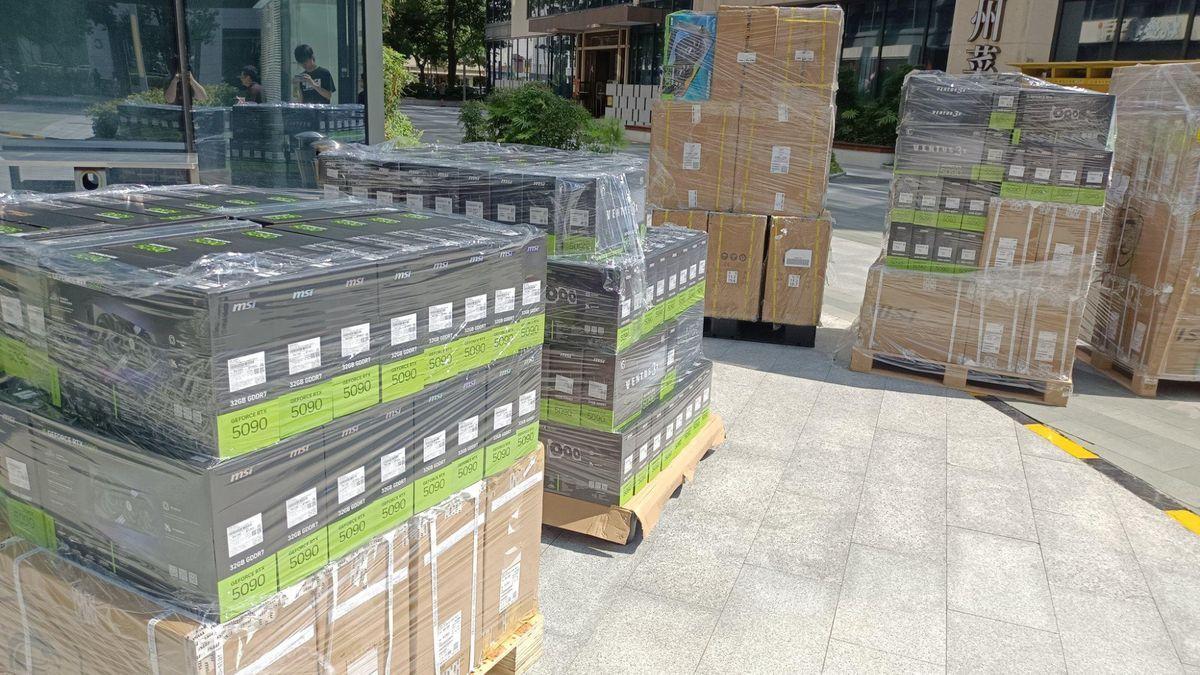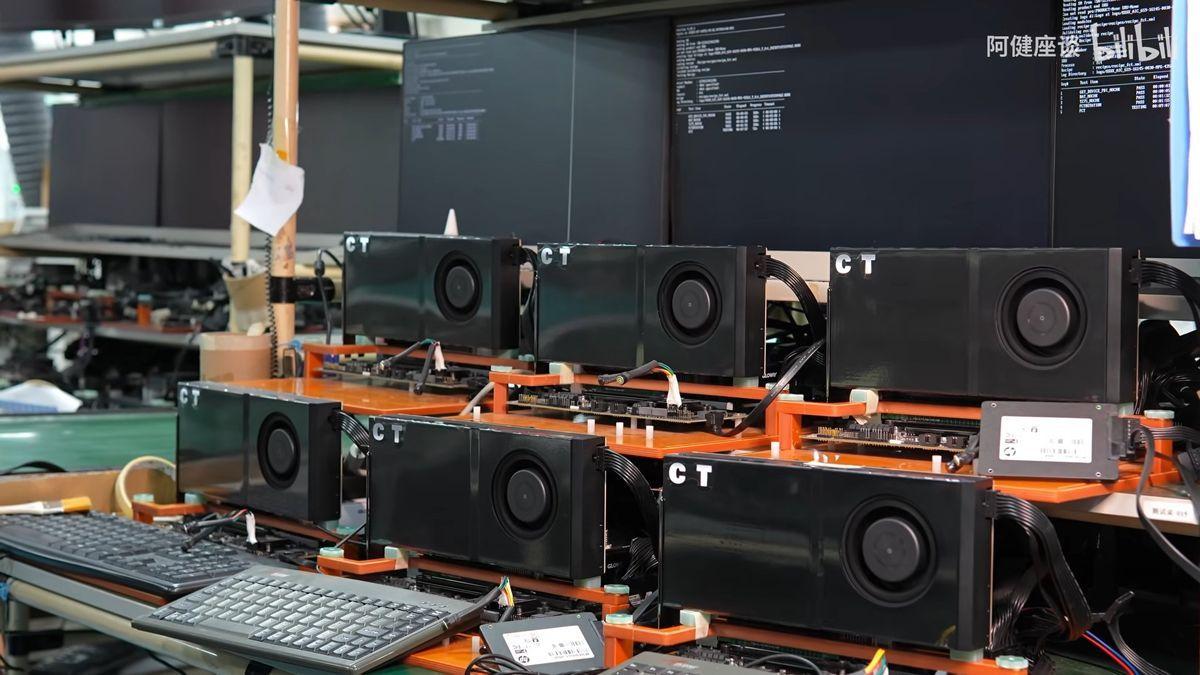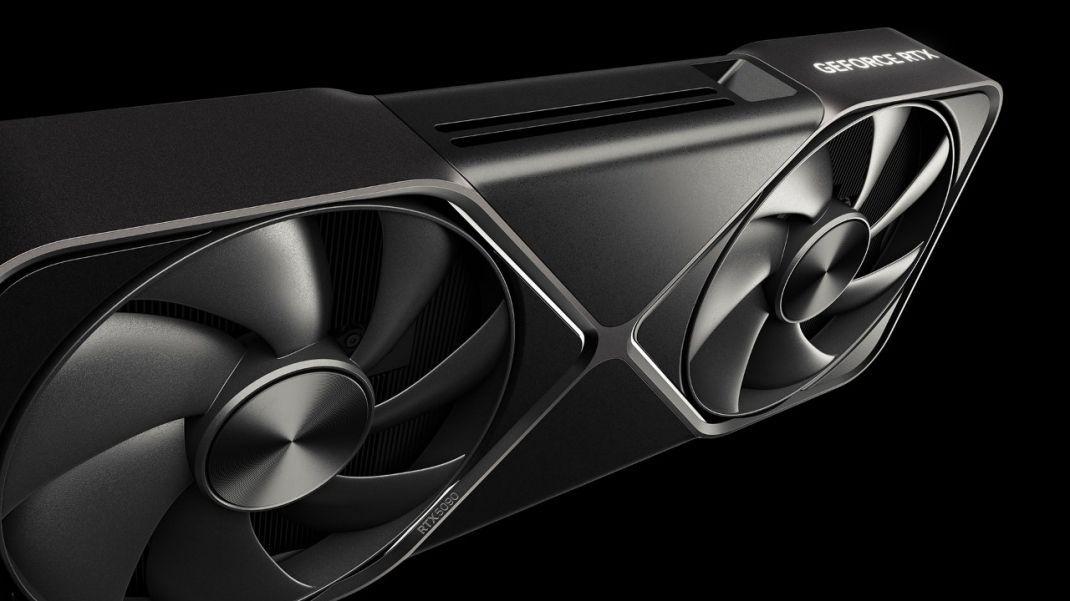MSI Denies Involvement in Alleged RTX 5090 Sales in China Amid Export Control Concerns
2 Sources
2 Sources
[1]
MSI fervently denies RTX 5090 sales in China after pallets of illicit GPUs spotted in the country -- company says it has identified 'unauthorized distribution unrelated to our sales policy'
'We clarify that MSI has never officially sold or distributed the GeForce RTX 5090 in China' MSI has issued a statement clarifying that it does not sell Nvidia's RTX 5090 GPU, following a spate of rumors and a photograph circulating online depicting hundreds of MSI-branded cards at an unspecified location in the country. Three days ago, a user on Reddit posted an image showing unattended pallets of RTX 5090 GPUs lying in a street in China. This prompted online chatter pertaining to a lack of enforcement for export controls, as the RTX 5090 is one of many high-end cards that are banned from export to China. Aware of the PR connotations of getting caught, or even accused, of dealing the GPUs in the region, MSI was quick to issue a rebuttal. an insane number of RTX 5090s spotted in China from r/pcmasterrace In a new statement posted on its site, the company has clarified that it had nothing to do with the RTX 5090 shipments spotted in China, and claims the global serial number tracking has confirmed they are parallel imports -- when a genuine product is imported through questionable means, without the explicit permission of the parent company. Dealers skirting export controls on high-demand GPUs remains a headache for Washington. Just recently, a Singaporean company was accused of helping smuggle $2 billion worth of Nvidia GPUs into the country. We've known for a while now that underground markets exist in the region, where cards are regularly modded with increased VRAM to make them better for AI applications. All of this leads to a precedent where, even though Beijing shouldn't be the recipient of high-end AI cards on paper, reality begs to differ. Nvidia has made region-specific RTX 5090D and 5090D V2 models for China, but they carry neutered specs, which leads to shady, black-market shipments thriving. Nvidia has always held the position that China is an important market for the chipmaker, but that it, too, has nothing to do with how the region keeps getting its hands on banned GPUs. MSI reiterated that it only sells its RTX 5090 in the U.S., Europe, and some Asia-Pacific markets, and that any unauthorized units obtained via grey channels are not covered under warranty. These illicit GPUs allegedly arrived in China through third-party resellers and retailers in overseas markets who bypassed regulations and illegally imported the cards. While there was no word on any active investigations or whether the hardware manufacturer plans to take action, MSI did note that any products bought through non-official channels may have been resold or tampered with, and aren't eligible for warranty, repair services, or technical support. MSI is a Taiwanese company, a country that remains imperative in the ongoing U.S.-China trade war, and is an extremely sensitive region geopolitically. A significant portion of MSI's production facilities is located in Mainland China.
[2]
MSI denies selling selling the RTX 5090 in China after pictures surface showing giant pallets of the restricted GPUs in the country
an insane number of RTX 5090s spotted in China from r/pcmasterrace Current US export restrictions have it that the RTX 5090 isn't allowed to be sold to Chinese customers, as this would be giving a competitor too much powerful tech. That's why Nvidia makes and sells a cut-back version of the GPU to China -- first the RTX 5090D and then the RTX 5090D V2, the latter having launched just a couple of months ago. But there's been talk (and specifically images) of MSI RTX 5090 graphics cards ending up in China, so MSI has just clarified that "MSI has never officially sold or distributed the GeForce RTX 5090 in China." Amidst back-and-forth tariffs and restrictions in the US-China trade war over the last few months, there have been reports of big smuggling operations running restricted AI chips into China. For instance, earlier in the year a Financial Times investigation suggested at least $1 billion worth of Nvidia GPUs were shipped to China during strict export controls, and there have even been arrests in a different case regarding exports of "tens of millions of dollars' worth of sensitive microchips used in artificial intelligence (AI) applications" over the last three years. And despite Nvidia's protestations that we shouldn't tell "tall tales that large, heavy, and sensitive electronics are somehow smuggled in 'baby bumps' or 'alongside live lobsters," it does seem that restricted Nvidia chips have been ending up in China. The latest on this front, which VideoCardz points out is likely what MSI is referring to, is a bunch of MSI RTX 5090 pallets seemingly pictured in China. It's likely this that MSI is denying involvement in, in addition to reaffirming its compliance with international regulations: "We strictly comply with international regulations and Nvidia's regional authorization framework. The GeForce RTX 5090 is available only in the Americas, Europe, and select Asia-Pacific markets. In China, MSI offers only the GeForce RTX 5090 D and GeForce RTX 5090 D V2 -- versions designed to meet local regulatory requirements. Any RTX 5090 units appearing in China can therefore be clearly identified as non-official supply. "Our global serial-number tracking shows that these products mainly originate from overseas retail markets, imported by unauthorized distributors or resellers through parallel channels. They are outside MSI's official supply chain, unverified in source and handling, and not covered by our quality-control or warranty policies." RTX 5090 cards aren't the only Nvidia chips to face restrictions, of course, as AI server accelerators have been restricted, too. Earlier in the year, H20 GPUs were banned from being exported to China. Then, Nvidia started applying to sell H20s to China again after the US government assured the company that licenses would be granted. But since then, China has been resistant to getting the chips, and Nvidia even paused production because of this. It's not only the US that doesn't want powerful Nvidia chips in China's hands -- China doesn't seem to want its companies and datacentres relying on US tech, either, and has apparently banned some companies from buying Nvidia's AI chips. Given all this, it's not surprising that MSI would want to explicitly distance itself from any possible restricted GPUs ending up in China. Those are diplomatic waters companies could do without splashing around in. And although I can't claim any knowledge at all, it's also reason to believe no big GPU retailer would risk attempting to sell such GPUs to China through any kind of back door right now.
Share
Share
Copy Link
MSI has issued a statement denying any official sales or distribution of Nvidia's RTX 5090 GPUs in China, following the circulation of images showing pallets of these restricted graphics cards in the country. The incident highlights ongoing challenges in enforcing export controls on high-end AI chips.
MSI's Official Denial and Export Control Concerns
MSI, a prominent hardware manufacturer, has issued a statement vehemently denying any official sales or distribution of Nvidia's RTX 5090 GPUs in China
1
. This response comes in the wake of circulating images on social media platforms, including Reddit, showing pallets of MSI-branded RTX 5090 graphics cards in an unspecified location in China2
.
Source: Tom's Hardware
The incident has sparked discussions about the effectiveness of export controls, as the RTX 5090 is among the high-end cards banned from export to China due to ongoing trade restrictions between the United States and China
1
2
.Unauthorized Distribution and Parallel Imports
MSI claims that its global serial number tracking has confirmed these GPUs are parallel imports – genuine products imported through questionable means without the explicit permission of the parent company
1
. The company stated that any RTX 5090 units appearing in China can be clearly identified as non-official supply, originating mainly from overseas retail markets and imported by unauthorized distributors or resellers through parallel channels2
.Implications for Warranty and Support
MSI has emphasized that products obtained through these unofficial channels are not covered under warranty and are ineligible for repair services or technical support
1
. This stance highlights the risks associated with purchasing high-end hardware through grey market channels, potentially leaving consumers without recourse in case of product issues.Broader Context of US-China Trade Tensions
This incident is set against the backdrop of ongoing US-China trade tensions, particularly in the high-tech sector. Recent reports have suggested significant smuggling operations of restricted AI chips into China, with investigations indicating at least $1 billion worth of Nvidia GPUs shipped to China during strict export controls
2
.Related Stories
China-Specific GPU Variants and Market Dynamics
To comply with export restrictions while maintaining a presence in the Chinese market, Nvidia has developed region-specific models such as the RTX 5090D and 5090D V2 for China
1
. However, these variants come with reduced specifications, potentially driving demand for the full-fledged RTX 5090 through unofficial channels1
2
.Geopolitical Sensitivities and Corporate Compliance
As a Taiwanese company with significant production facilities in Mainland China, MSI finds itself navigating complex geopolitical waters
1
. The company's swift denial and emphasis on compliance with international regulations underscore the sensitivity of these issues and and the potential repercussions for companies caught in the crossfire of international trade disputes2
.References
Summarized by
Navi
Related Stories
Chinese Firms Convert RTX 5090 GPUs into AI Accelerators, Bypassing Export Restrictions
26 Jul 2025•Technology

NVIDIA's RTX 5090D for China: AI and Crypto-Mining Restrictions Spark Controversy
17 Jan 2025•Technology

NVIDIA Develops RTX 5090 DD: A New GPU Variant for China Amid Export Restrictions
19 Jun 2025•Technology

Recent Highlights
1
ByteDance's Seedance 2.0 AI video generator triggers copyright infringement battle with Hollywood
Policy and Regulation

2
Demis Hassabis predicts AGI in 5-8 years, sees new golden era transforming medicine and science
Technology

3
Nvidia and Meta forge massive chip deal as computing power demands reshape AI infrastructure
Technology





